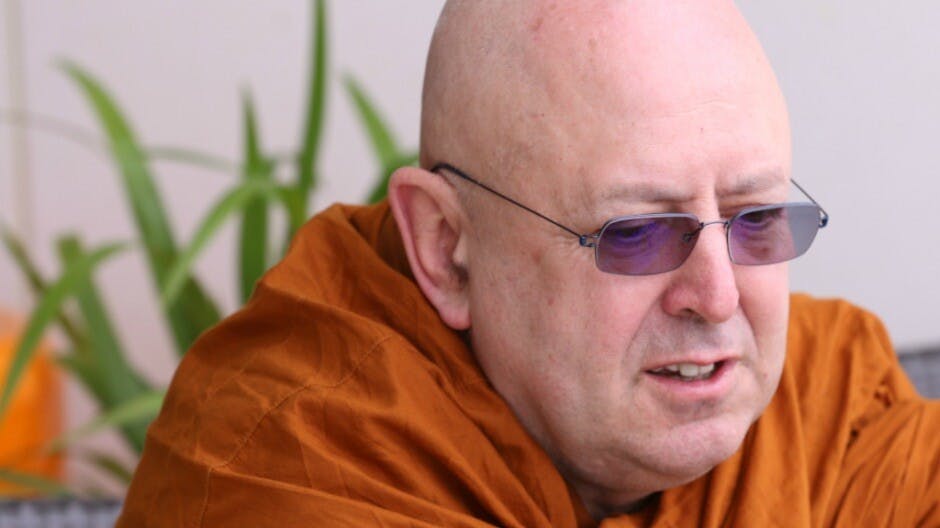Previously on the Conversation with Ajahn Brahm:How to Mend a Broken Heart(訪談錄上集)
Ajahn Brahm is a British Theravada Buddhist monk born in London. He read theoretical physics at The University of Cambridge and graduated with first class honours. A year later, he traveled to Thailand to become a monk and to train with the Ajahn Chah Bodhinyana Mahathera. He is now the Abbot of Bodhinyana Monastery in Western Australia, and the Spiritual Director of the Buddhist Society of Western Australia, amongst others. He has been invited many a time to give seminars at the headquarters of Facebook, Google and the United Nations. The books he authored have been translated into many languages, including famously The Art of Disappearing, and Good? Bad? Who Knows?
Ajahn Brahm,生於倫敦,劍橋大學理論物理學一級榮譽畢業。出家為僧40多年,師隨南傳佛教(上座部)尊者阿姜查(Ajahn Chah)。時常獲邀到重要國際會議和跨國組織總部演講,如聯合國、Google、Facebook。著作風行全球,有多種語言譯本,如《禪悅在當下》、《好?壞?誰知道?》(本社特闢專欄轉載中譯本)。目前承擔多種佛教職務,為澳洲柏斯覺乘寺住持。Ajahn,泰語「老師」。
欣然接受傷害 Embracing Wounds
訪者:Human being 是什麼?
Ajahn:Human being 極其罕見,我只見過 human doing,human going,極少見到 human being。你聽明白了嗎?(訪者:明白,human being 應該要花更多時間 being。)Being,對,可能像你父母或者祖父母那樣,閑來無事,也沒有地方要去,不需要去買東西或者查看電郵。就那樣坐在這裏,什麼都不做……
訪者:你覺得人……你見過最邪惡的事是什麼?或者某些最邪惡的人。
Ajahn:我經歷過最邪惡的事——我昨晚也在港大李兆基會議中心大會堂的講座中說過——聽到人們怎樣受虐,怎樣遭受強暴,這種大禍。其實那些受害人並沒有做錯什麼,只是不巧出現在某時某地而已。有些人對人做的事,我真的很難理解。(我們日常生活中也會發生一些事,我不會說很邪惡,只是有點……的確他們會互相欺騙,會令彼此失望,諸如此類。這些事當然令人受傷,但很多時人們容許自己太易受傷了。)有些真正可怕的禍端,例如有人會去抓捕一個年輕女孩,樂此不疲地污辱她,這是要了她的命啊。不過即使傷得那麼深,也不是無可挽回的。若能治好這些女人因強暴而粉碎的心,是一件上上善舉。她們的心已經徹底死了;雖然身體還活着,心卻似墮進萬丈深淵,深不見底,而你能把這顆心找回來,這不是很了不起嗎?——哪裏有惡行,或者惡行留下的傷疤,哪裏就有克服它、打敗它的良機。我就是喜歡這樣:戰勝邪惡。
訪者:是的,但你要很能幹才能做得到。像我們這樣的凡夫俗子,壞事臨到時,我們可以怎樣抵擋?
Ajahn:這的確很難,很多人都沒有那份勇氣去欣然接受傷害,不再嘗試擺脫。(訪者:欣然接受很難。)不難,反而不去接受才會陷入困境。說到底你可能只是需要一點鼓勵。我不知道有沒有什麼事——可能可以私下談談——在你身上發生過什麼事,有什麼埋藏在你心底深處,可能像個病毒,令你沒有辦法去愛,輕輕鬆鬆放開懷抱,直至你能培養出一段美好的關係。其實應該要這樣:面對、承認,然後由它去。要銘記於心,從中學習,知道自己這個人並沒有因那些事貶低了。
個人來說,佛理的力量仍然令我驚奇。有些事心理學家做不到,精神科醫師做不到,但佛理的教導做得到。一個女人被人那樣虐待,仍然可以重獲新生……其實如果是我,我也不知道能夠怎樣生存下去,(訪者:但佛理幫助她活下去了。)這就啟發了我。
訪者:你說過那是情感上的治療,可能非科學能夠解釋。
Ajahn:對,對。很好。我們很容易相信在研討會上、書本上、大學裏學到的。(訪者:正是如此。)不行,你要自己感受、用心感受。
訪者:還要有勇氣。——許多人日子過不好就來找你,那麼多壞情緒,你怎應付得了?
Ajahn:我很喜歡壞情緒。因為在我而言,壞情緒就像屎那樣——嗯,如果你想的話,我可以換個說法——不過屎是肥料,肥料能夠養活樹木。芒果那麼肥甘,蔬菜那麼怡人,都是多得肥料啊。
訪者:嗯,但你……你總和芒果樹不太一樣……
Ajahn:一樣的啦!我也會成長,會更有智慧,更能同情他人。無論旁人給我什麼,我總有辦法轉化。
訪者:如何轉化?
Ajahn:改變心態。當有人無故呼喝我,他當時心情一定非常差,我會理解,會深感同情。雖然我不知道原委,不過他一定是非常痛苦,才會這樣來找我的碴。既然不是我的問題,我就依然故我好了,依然可以開心,依然可以平靜。我明白問題不在我這裏,而是在他身上。同時我會盡力令他平靜下來。用身體語言就夠了:四目相對,仁心相待。——其他人可能早就遠遠躲開了,我也沒什麼實際的可以做,但起碼我可以體諒他們,嘗試令他們和善一些。

Interviewer:What is a human being?
Ajahn:Human being is something which is very rare in this world. I only ever see human doing things, human going somewhere, very rarely do I see a human being here. You got that? (Interviewer:Yeah I got that. Human being should spend more time being.) Being, yeah, and that’s what maybe your parents or your grandparents do; you have to do that. They could just chill out, not doing anything, not going anywhere. Not going shopping, not checking emails. Just sitting here, just do absolutely nothing……
Interviewer:Do you think people……What is the most evil thing, or what is the most evil sort of person you’ve ever seen?
Ajahn:The most evil thing I’ve experienced is when I was listening to people who’ve been tortured, listening to people who’ve been raped, I mean the really big stuff. They could be just people who have been to the wrong place in the wrong time. Some of those things which people do to each other – that I find very hard to understand. (You know all these stuff of life, that most people do, I never looked at it as evil, I just look at it as a bit……yeah they cheat each other, they let each other down, and just these stuff. It hurts people but a lot of times people just allow themselves to get hurt too easily.) The real bad stuff you know when people take a young girl and just take sexual pleasure out of her hour after hour and just, they killed her hard. But it’s not irreparable. That’s one of the wonderful things to do: to repair a woman’s heart, which is been ripped apart by rape. It’s been destroyed and there’s hardly any life left in it. Her body is alive but her heart is just in this deep, deep, deep hole, and you get it out. It’s an amazing thing to do. So whenever there’s the evil, or the scars of evil, it’s where gets you an amazing opportunity to overcome it, to beat it. And that’s what I love doing, to beat the evil.
Interviewer:Yes, but you have to be very capable to do so. Is there any ways for us, not like you, to defend ourselves against those wounds when some bad things happen to us?
Ajahn:Yeah it’s very hard. Most people haven’t got the guts to do that. And that’s to embrace them. Stop trying to get rid of them. (Interviewer:It’s very difficult, to embrace.) No, it isn’t. It’s difficult not to. But, in the end, you just need some encouragement. I don’t know if there’s, maybe off the record, if anything has ever happened to you, and when it’s buried deep inside, it’s like a virus inside of you, and it destroys your ability to love and to have fun until you get a good relationship going; and you have to be that way, to bring it up, to acknowledge it and let it happen. Remember it, learn from it, and you’re not a diminished person because of it.
It still amazes me, just being personal, amazes me just how much power that Buddhism has. Psychologists can’t do this, psychiatrists can’t do this, but you get some really nice teaching and you can do this. You can take a woman who’s been so tortured and you can actually turn her around, until she’s……it inspires me to see such woman who’s been there, gone through stuff that I don’t know if I can ever manage to survive.
Interviewer:As you said it’s emotional, maybe not scientific.
Ajahn:Yes, yes. Good. People tend to just believe what they hear in seminars and in books and in universities. (Interviewer:Yeah that’s how we do it.) And that does not work. You have to feel it in your heart and to feel it yourself. (Interviewer:Yes, and it takes courage.)
Interviewer:Yes, and it takes courage. And you’re receiving so much negativity from people, how do you handle it?
Ajahn:I love negativity. Because, to me, negativity is like shit, I’ll change that word if you wish. And shit is fertiliser. And fertiliser makes all the trees grow. It makes beautiful mangoes. And that makes beautiful vegetables that are really tasty.
Interviewer:But, but you’re no mango tree……
Ajahn:Of course I am. I can always get wiser and more compassionate. And that means whatever people give me I can transform.
Interviewer:How do you do it?
Ajahn:How do you do it? By just changing one’s attitude. If someone shouts at me, that I feel that they must be in a very very bad mood and I feel so much compassion for them. I’m not sure what they’re going through but that must be very painful for them to get upset and angry at me so I don’t feel any problems from myself. I’m happy, I’m at peace. It’s not the problem here so that problem is in that person, so I try my very best to see how just by body language, by looking in their eyes and being kind, I can calm them down and make them all peaceful so at least. Everybody else maybe hiding throughout the day, and I’m not going to do much about that – but at least I can make them a kind person, and I can understand that person.
妒忌 Jealousy
訪者:人與人相處常有妒忌。有人妒忌你嗎?
Ajahn:有,當然有。名氣會帶來麻煩,總有人會想把你拉下去。就像讓比丘尼出家那件事上,許多人都覺得很難挑戰我的論點。大家都知道我不止是老師,還是學者,我知道底裏的來龍去脈,知道自己在做什麼。我無懼和任何人辯論,所以他們那麼怕我。我腦袋本來就不錯,而且在劍橋訓練過(訪者:而且是物理),對,物理,一門困難的學問。我很清楚自己的責任,既讀過、也能夠引述佛陀親口說的話。有些出家人之所以害怕我,就是因為知道我基本功好,他們要是和我爭論學理,一定會輸給我。(訪者:還跟你爭論嗎?)不會了,他們輸得太多了。就拿比丘尼這件事來說,他們同樣沒法跟我爭論、說我做錯,因為我能夠充分引述佛陀的話語和戒律。其實他們就是知道我是對的,才旁門左道的攻擊我,而不是去反駁我的論點。你知道這就是拉丁文說的 ad hominem 了——針對人,不是針對爭論本身。
訪者:他們做了些什麼?
Ajahn:就是說我動機不良呀,說我是個邪惡的僧人。有個指控令我很驚訝:他們說我改變這些規矩,為的是我自己的利益,無關於幫助別人。我不是這樣做的,大家也看得到我不是,所以這也不算什麼。又有一次,有個僧人來到澳洲,因為侵犯女性而坐了牢,有報紙訪問我這件事,我說這與我們的組織全無關係。他來時我就逮到他一副不守本份、我行我素的樣子,他相當不高興。我們猜他就是被抓的那個人吧。可是幾天之後,寺外的汽車上都放滿了傳單,寫道:「不要相信 Ajahn Brahm,他和我老婆睡覺。」類似的指控。攻擊一個出家人——而且從守身這方面去攻擊——有時真的輕而易舉。(訪者:生安白造。)生安白造,但我想說的是,如果你想防衞自己,就要坦蕩蕩的。我事無不可對人言,也並沒有匿藏在自己的茅屋裏,大家常常都見到我。
訪者:你有辯解嗎?
Ajahn:這種指控,你很難為自己辯解。你說你沒有做過,大家都會說「他一定是這麼說的」。所以你只能坦誠相告:告訴你認識的人、其他出家人,他們自然會為我辯護。這麼多年了,我都活在大家的目光之下,並沒有匿藏起來。一切都是坦蕩蕩的,就來我住的地方找什麼犯罪證據吧。——這就是你為自己辯護的唯一方法。總有人會妒忌你,會攻擊你,但只要你毫無遮瞞,不顧左右而言他,攻擊都會自然平息。
訪者:你猜有沒有人憎恨你?
Ajahn:沒有,我想妒忌會比較多。我受歡迎,而且因為比丘尼的事。他們都知道自己是錯的,卻不能承認。
訪者:你曾嫉妒誰嗎?
Ajahn:妒忌?沒有,因為如果有人……沒有,我不妒忌人。這道問題很好。
訪者:出家之前呢?
Ajahn:有的,有時罷。我出家之前,甚至出家之後都會想:「為什麼我得這麼賣力工作,其他僧人卻不用?」「為什麼我不能禪修多些?其他僧人好像禪修多些。」然後我們寺裏總有些柴米油鹽的事情,要輪班處理。我就想反正都要做了,那就做吧,就試着做得輕鬆好玩一點。比如說那天明明未輪到自己做洗濯的工夫,我倒趕在前頭去做,幫負責的僧人先做好了,那就是我的功勞了!我很喜歡這樣——那不是你的工作,不是我的工作,是我們的工作。那時候,如果有人當天是應該要去洗東西的話,他就得趕快去洗,因為如果他不趕快去洗,我就會趕在他前頭去洗了!所以,不要老想着那是別人的工作。不要妒忌,不要不高興。

Interviewer:Jealousy is commonplace. Do people get jealous of you?
Ajahn:Yeah of course they do. But that one I know. That’s the trouble when you get famous. But when you get well-known, they do so, some people trying to pull you down. Yeah so you had the giving ordination to the bhikkhunies and for many people that was very challenging for them because they knew that I’m not just a teacher, I’m also a scholar, I know my party, and I could argue with anybody and that’s why they’re afraid of me because they know that I know my stuff. I got a good brain and it was trained in Cambridge. (Interviewer: And physics.) Yeah and physics, it’s a hard subject. So I know my part and I can read those what the Buddha said, I can quote what the Buddha said. And that’s scary for some monks because they know I’ve got a foundation. They don’t argue with me cause sometimes if it’s on a scholastic debate and they will lose. (Interviewer: Do they still argue with you?) No they don’t anymore because they’ve lost too many times. And so because of that, that when it came to the bhikkunies, they could not argue with me that I did something wrong cause I had all of the quotes from the Buddha, the vinaya they knew I was right. So they try other ways, what they do is if they have a disagreement, they’ll try to destroy the person rather than the message. And that’s ad hominem in Latin.
Interviewer:What did they do?
Ajahn:Well try and just say that I had bad motives, I was a bad monk. One of the things actually they said which was just made me very surprised, was that in my organisation, our Buddhist society, our monastery, that I changed the rules against the will of the other monks and I was basically a despot and I was doing it for my own benefits rather than benefit of others. And because I don’t do that and because people see that I don’t do that, it was no problem at all. On another occasion, there was a monk who came into Australia, and he went to jail for sexually assaulting women and when I was asked by the newspapers, I said that was nothing to do with our organisation. He just came in and I caught him like a rogue monk, a loose cannon and he was very upset at that. And so we think it was him, but a few days later, there were pamphlets put on all the cars outside the temple and said, “Do not believe Ajahn Brahm, he slept with my wife.” Accusations like that. So sometimes it’s very easy to attack a monk and on celibacy. (Interviewer: They just make things up.) Make things up, but the point is, that you have to be able to be open enough to actually defend that. And so because I’m being open, I haven’t been hiding away in my hut. People see me all the time.
Interviewer:Did you defend yourself?
Ajahn:You can’t defend yourself against such accusations. If you say “I didn’t do it.” They’d say, “That’s what he would say.” So you just open it up to all the people who you knew – the other monks, all the people who you knew, and they’ll defend me. Because I’m seen for so many years, because I don’t hide away. That everything is open so let’s see if they can find any smoking gun cause the door is always open, find it. So that’s the only way to defend yourself. You do get attacks, because other people do get jealous of you, but because you know you don’t hide away, you have no secrets, it’s nothing sticks.
Interviewer:Do you think anybody hates you?
Ajahn:Hate? No I think it’s more like jealousy I think. Because you know being popular, especially because of the bhukkhuni thing to many people. They know they’re wrong but they can’t admit it.
Interviewer:Have you ever gotten jealous of anyone?
Ajahn:Jealous? No. Because if anybody…… No, haven’t been jealous. It’s a good question.
Interviewer:Before you became a monk?
Ajahn:Yes sometimes. Remember before I became a monk or even when I became a monk, “why do I have to work so hard and these other monks don’t have to work so hard”, “Why can’t I go and meditate more, these other monks meditate more.” And after all, sometimes it’s just great service cause all the chores in the monastery – yeah we have the roster today it’s your duties to do this, today it’s another duty. Say if it’s not your turn to wash up, it’s somebody else’s turn, see if you can get there earlier and wash up for them. In other words, if it needs to be done, just do it. And so this is not my job, it’s not your job, it’s our job. So if I can do the job first, I get there first, I get all the merit. That’s what I love doing. Just playing around. So even if it’s somebody else’s job to do the washing up, they gotta be quick, if they’re not quick, I’ll get there first and I’ll do it. So it’s not somebody else’s job. I love doing it. So that means you don’t get jealous. You don’t get upset.
最後一集 Finale:Want to Succeed?Do Thing 想成功,先要學懂什麼都不做
(Photos: Master Insight Media)






































